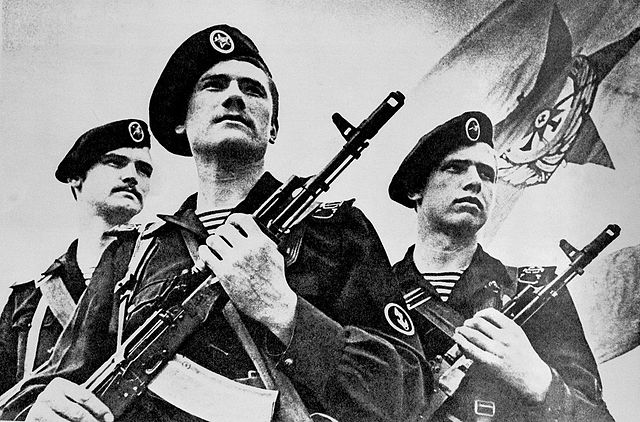In December, the PowerBlog is marking the centenary of Aleksandr Solzhenitsyn’s birth (Dec. 11, 1918)
At the NewYork Times, Solzhenitsyn biographer Michael Scammell says the Russian novelist and historian “did more than anyone else to bring the Soviet Union to its knees.”
For his critical approach to Soviet life, Solzhenitsyn was evicted from the state-sponsored Writers’ Union and became a virtual outlaw in his own country. But he was far from alone. Many talented and independent writers — Varlam Shalamov (a fellow chronicler of the Gulag), Andrei Sinyavsky, Yuli Daniel and Joseph Brodsky — were circumventing the Soviet censorship with a new publication format called samizdat. It consisted of self-published poems, stories, novels, human rights appeals and political manifestoes that were secretly circulated in typed and mimeographed copies; in many cases, they were also sent abroad.
By the end of the 1960s, the leading writers and activists came to be known as the Dissident Movement. Their goal was to bring about freedom of expression and peaceful political change in the Soviet Union, and they garnered a global audience of readers. Besides writers, their ranks included scientists, engineers, academics, lawyers, even rebellious workers; their unofficial leader was the Nobel Prize-winning physicist Andrei Sakharov.
Solzhenitsyn sympathized and cooperated with Sakharov and the other dissidents, but he didn’t always agree with them, and he continued to follow his own path. In 1973, still in the Soviet Union, he sent abroad his literary and polemical masterpiece, “The Gulag Archipelago.” The nonfiction account exposed the enormous crimes that had led to the wholesale incarceration and slaughter of millions of innocent victims, demonstrating that its dimensions were on a par with the Holocaust. Solzhenitsyn’s gesture amounted to a head-on challenge to the Soviet state, calling its very legitimacy into question and demanding revolutionary change.
After his return to Russia, Solzenitsyn continued to speak out against wrong turns in his homeland, particularly the chaos that followed the collapse of communism. Scammell:
… Solzhenitsyn disapproved of what he saw as the new [Yeltsin] regime’s adulation of the West and its foolish desire to introduce a form of Western democracy. What he advocated was a strong leader, who maintained strict order in the country, encouraged more religion and state support for the Orthodox church, together with a revitalized patriotism and a return to traditional values.
He seemed to get his wish in 2000, when Mr. Yeltsin handed the presidency over to a man who shared Solzhenitsyn’s nationalist views and personified his ideal of a strong leader: Vladimir Putin. The new Russian leader made a show of welcoming Solzhenitsyn to his residence and seeking his advice, and in 2007 he bestowed a state award on the author for his humanitarian activities (Solzhenitsyn had refused similar awards from Mr. Gorbachev and Mr. Yeltsin).
Solzhenitsyn died in 2008, before Mr. Putin showed his true colors with the coldblooded murders of opposition figures, the creation of an authoritarian state, the invasion of Ukraine and the Crimea, and the whittling down of local democracy in the provinces. (Solzhenitsyn might well have approved of the Ukrainian measures, since he was half-Ukrainian by birth, but not the others.)
After his death Solzhenitsyn was given a sumptuous funeral and buried at the Donskoy Monastery in Moscow. In 2010 “The Gulag Archipelago” was made required reading in Russian high schools. Moscow’s Great Communist Street has been renamed Aleksandr Solzhenitsyn Street, his centennial is being celebrated with great pomp this week in Russia, and a statue of him in Moscow is planned for the near future.
All this would give the writer great satisfaction. But though feted and exploited by questionable allies, Solzhenitsyn should be remembered for his role as a truth-teller. He risked his all to drive a stake through the heart of Soviet communism and did more than any other single human being to undermine its credibility and bring the Soviet state to its knees.
Home page photo: Soviet naval infantrymen carrying AK-74 assault rifles. 1985. Wiki commons/public domain

